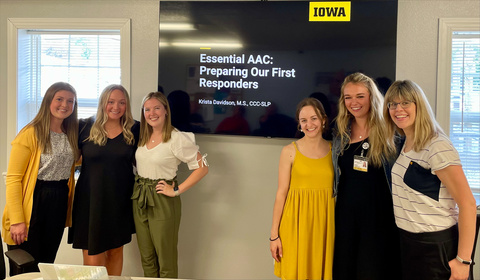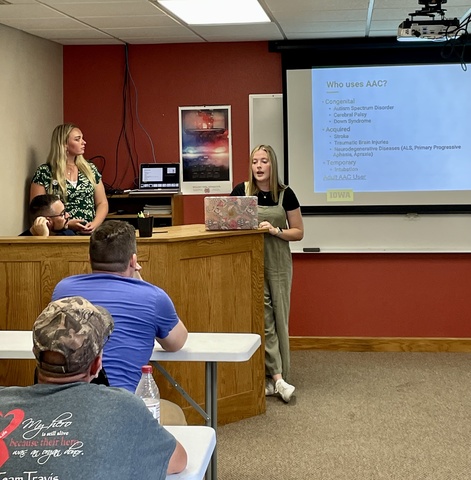By Emily Delgado and Charlotte Brookins
Imagine an already stressful situation—like a fire, car crash, or injury. But when first responders arrive, they cannot effectively communicate with the people at the scene.
This is a reality when those needing help may have limited speech. This could include people with autism, aphasia, cerebral palsy, and other conditions that limit verbal speech.
University of Iowa clinical associate professor Krista Davidson and her graduate student clinicians are trying to help. She and her students work in the Department of Communications Sciences and Disorders, which offers the UI’s top-ranked audiology and speech pathology programs, in the UI College of Liberal Arts and Sciences.

The group created a training course to teach first responders in Iowa how to approach emergencies where they encounter individuals with limited speech. They have presented in Washington County, Blairstown, and Tiffin, with more towns scheduled throughout the summer. The workshop includes identifying conditions that can use low-tech or high-tech augmentative and alternative communication system boards, and how to recognize those tools.
“The overarching goal of this project is to equip first responders in Iowa with foundational knowledge and resources to effectively communicate with patients who have limited oral speech,” Davidson explains. “They walk away with strategies for how to respond to a communication breakdown during an emergency.”
Davidson helped organize the workshop after realizing a portion of a communication disaster relief and recovery stipend was dedicated to educating first responders about the needs of individuals with speech disabilities. Together, she and her graduate students help educate first responders all across the state.
“As a contributor to this project, I attend the trainings that we conduct at the various ambulance services and fire stations around Iowa,” says second-year speech-language pathology (SLP) graduate student Hannah Leeper. “A few of my classmates and I work together to present a slideshow to inform the first responders about alternative and augmentative communication (AAC) and working with patients who use modes of communication that are unfamiliar to most people.”
In addition to educating others, the students involved are also engaging in valuable learning opportunities and experiences themselves.
“This was an educational experience for me! I learned a lot about first responders and how they approach emergencies,” says Anna McCormick, another second-year SLP graduate student. “Education is a major part of being a speech pathologist—prior to this experience, I had just considered parent education, but community education is just as important."

Currently, most EMS training courses do not thoroughly explain how to interact with people who have limited speech. She says it is vital responders have these skills to ensure the safety of everyone during a crisis.
“I wondered how much more we could do to help first responders communicate with their patients with complex communication needs. I knew this could be a great project for our graduate students as well as an excellent avenue for departmental community outreach,” Davidson explains.
Davidson says this is an opportunity for her students to fill this void locally and take advantage of experiential learning.
“Information that does exist has not been widely shared with first responders,” Davidson says. “As speech-language pathologists, it is within our scope of practice to advocate for these populations and educate others in our community.”
Communities continue to express interest in offering this workshop to police, ambulance, and fire services in the area. The workshop currently comes at no cost to the agencies and provides free, laminated communication boards.
“Our hope is to give first responders tools to make communication with patients in emergency situations as accessible and efficient as possible, ultimately resulting in improved patient care,” says fellow SLP master’s student in Abby Wickre. “I am so happy to be a part of a team that supports the great work first responders do.”